At the Artificiality Summit 2024, Michael Levin, distinguished professor of biology at Tufts University and associate at Harvard’s Wyss Institute, gave a lecture about the emerging field of diverse intelligence and his frameworks for recognizing and communicating with the unconventional intelligence of cells, tissues, and biological robots. This work has led to new approaches to regenerative medicine, cancer, and bioengineering, but also to new ways to understand evolution and embodied minds. He sketched out a space of possibilities—freedom of embodiment—which facilitates imagining a hopeful future of \.
Category: bioengineering – Page 24
Michael Levin — Non-neural intelligence: biological architecture problem-solving in diverse spaces
Recorded 6 November 2024. Michael Levin of Tufts University presents “Non-neural intelligence: biological architectures for problem-solving in diverse spaces” at IPAM’s Naturalistic Approaches to Artificial Intelligence Workshop. Abstract: The familiar, readily-recognized intelligence of brainy animals has long served as inspiration for AI. However, biological intelligence is far older than neurons, and indeed than multicellularity. My lab studies problem-solving in cells, tissues, and even subcellular components, operating in different spaces and at different scales than conventional intelligent agents. In this talk, I will describe a framework for detecting, communicating with, and creating collective intelligences, and show examples of how the fundamental properties of life suggest novel approaches for ethically relating to diverse and fascinating engineered and hybrid intelligences. Learn more online at: https://www.ipam.ucla.edu/programs/wo…
Dr. Michael Levin on Embodied Minds and Cognitive Agents
In this episode, Dr. Michael Levin, Distinguished Professor of Biology at Tufts University, joins Nathan to discuss embodied minds, his research into limb regeneration and collective intelligence, cognitive light cones, and much more. Dr. Levin and the Levin Lab work at the intersection of biology, artificial life, bioengineering, synthetic morphology, and cognitive science.
LINKS:
The Levin Lab and Dr. Michael Levin’s research: https://drmichaellevin.org/resources/
Dr Michael Levin’s blog: https://thoughtforms.life/about/
Tufts University Faculty Profile: https://as.tufts.edu/biology/people/f… Levin @ Wyss Institute: https://wyss.harvard.edu/team/associa… Dr. Levin’s Research on Limb Regeneration: https://news.uchicago.edu/how-bioelec… SPONSORS: The Brave search API can be used to assemble a data set to train your AI models and help with retrieval augmentation at the time of inference. All while remaining affordable with developer first pricing, integrating the Brave search API into your workflow translates to more ethical data sourcing and more human representative data sets. Try the Brave search API for free for up to 2000 queries per month at https://brave.com/api Omneky is an omnichannel creative generation platform that lets you launch hundreds of thousands of ad iterations that actually work customized across all platforms, with a click of a button. Omneky combines generative AI and real-time advertising data. Mention “Cog Rev” for 10% off www.omneky.com NetSuite has 25 years of providing financial software for all your business needs. More than 36,000 businesses have already upgraded to NetSuite by Oracle, gaining visibility and control over their financials, inventory, HR, eCommerce, and more. If you’re looking for an ERP platform ✅ head to NetSuite: http://netsuite.com/cognitive and download your own customized KPI checklist. X/SOCIAL @labenz (Nathan)@drmichaellevin (Michael) @CogRev_Podcast TIMESTAMPS: (00:00) Preview (01:07) Intro and brief summary (05:40) Xenobots, anthrobots and the other creatures created by Mike Levin (09:39) Bioelectric memory rewriting (15:01) Sponsor | BraveSearch API (16:09) The difficulty of conducting simulations, which involve running forward passes to predict and alter electrical patterns (20:30) The concept of backpropagation and mode switching in AI models (23:06) Why humans do not regenerate their limbs (37:10) Sponsor | Netsuite (39:40) Learning from small and biological systems onto the concept of possible emergence (45:16) The criticality of multiple scale questions and would a single scale? (55:49) The concept of the cognitive light cone (59:43) Advice on habits of mind and suggestions for inspiration on the AI side (1:13:36) Mike’s suggested directions for the AI developers (1:24:49) Wrap & Sponsor | Omneky The Cognitive Revolution is produced by Turpentine: a media network covering technology, business, and culture. Producer: Vivian Meng Editor: Graham Bessellieu For sponsor or guest inquiries, email: [email protected] Music licenses: ABZUSWHJII08TSRH 376I29BQPJASOLX2
Michael Levin @ Wyss Institute: https://wyss.harvard.edu/team/associa…
Dr. Levin’s Research on Limb Regeneration: https://news.uchicago.edu/how-bioelec…
SPONSORS:
The Brave search API can be used to assemble a data set to train your AI models and help with retrieval augmentation at the time of inference. All while remaining affordable with developer first pricing, integrating the Brave search API into your workflow translates to more ethical data sourcing and more human representative data sets. Try the Brave search API for free for up to 2000 queries per month at https://brave.com/api.
Omneky is an omnichannel creative generation platform that lets you launch hundreds of thousands of ad iterations that actually work customized across all platforms, with a click of a button. Omneky combines generative AI and real-time advertising data. Mention \.
Embodied Minds and Cognitive Agents with Dr Michael Levin
In this episode, Dr. Michael Levin, Distinguished Professor of Biology at Tufts University, joins Nathan Labenz of @CognitiveRevolutionAI Podcast to discuss embodied minds, his research into limb regeneration and collective intelligence, cognitive light cones, and much more. Dr. Levin and the Levin Lab work at the intersection of biology, artificial life, bioengineering, synthetic morphology, and cognitive science.
Nathan just recorded a second episode with Michael Levin, on view at • Convergent Evolution: The Co-Revoluti… — 📰 Be notified early when Turpentine’s drops new publication: https://www.turpentine.co/exclusiveac… RECOMMENDED PODCAST: 🎙️ @CognitiveRevolutionPodcast The Cognitive Revolution is a podcast about AI where hosts Nathan Labenz and Erik Torenberg interview the builders on the edge of AI and explore the dramatic shift it will unlock over the next decades. Spotify: https://open.spotify.com/show/6yHyok3… Apple: https://podcasts.apple.com/us/podcast… — SPONSORS: 🎙️ Dealcraft | Insights from Great Negotiators https://link.chtbl.com/3CG3TbHY?sid=T… is the brand new weekly podcast that features interviews with world’s greatest dealmakers and diplomats, including Former Secretary of State Henry Kissinger, Blackstone CEO Steve Schwarzman, and music industry super-lawyer John Branca, on their most challenging negotiations. Each episode, host Jim Sebenius (Harvard Business School professor and renowned negotiation expert) relates fascinating deal stories and distills useful insights for listeners to apply in their toughest deals and disputes. 📝 Notion offers powerful workflow and automation templates, perfect for streamlining processes and laying the groundwork for AI-driven automation. With Notion AI, you can search across thousands of documents from various platforms, generating highly relevant analysis and content tailored just for you — try it for free at https://www.notion.com/product/ai?utm… 💥 Head to Squad to access global engineering without the headache and at a fraction of the cost: head to https://choosesquad.com/ and mention “Turpentine” to skip the waitlist. — LINKS: The Levin Lab and Dr. Michael Levin’s research: https://drmichaellevin.org/resources/ Dr Michael Levin’s blog: https://thoughtforms.life/about/ Tufts University Faculty Profile: https://as.tufts.edu/biology/people/f… Michael Levin @ Wyss Institute: https://wyss.harvard.edu/team/associa… Dr. Levin’s Research on Limb Regeneration: https://news.uchicago.edu/how-bioelec… — X / TWITTER: @labenz (Nathan) @drmichaellevin (Michael) @CogRev_Podcast @TurpentineMedia — TIMESTAMPS: (00:00) Intro (04:50) Xenobots, anthrobots and the other creatures created by Mike Levin (08:50) Bioelectric memory rewriting (14:09) Sponsors: Dealcraft | Notion (16:17) The difficulty of conducting simulations, which involve running forward passes to predict and alter electrical patterns (20:38) The concept of backpropagation and mode switching in AI models (23:12) Why humans do not regenerate their limbs (37:10) Sponsor: Squad (38:19) Learning from small and biological systems onto the concept of possible emergence (45:01) The criticality of multiple scale questions and would a single scale? (55:40) The concept of the cognitive light cone (59:34) Advice on habits of mind and suggestions for inspiration on the AI side (1:13:19) Mike’s suggested directions for the AI developers (1:23:41) Wrap.
📰 Be notified early when Turpentine’s drops new publication: https://www.turpentine.co/exclusiveac…
—
RECOMMENDED PODCAST:
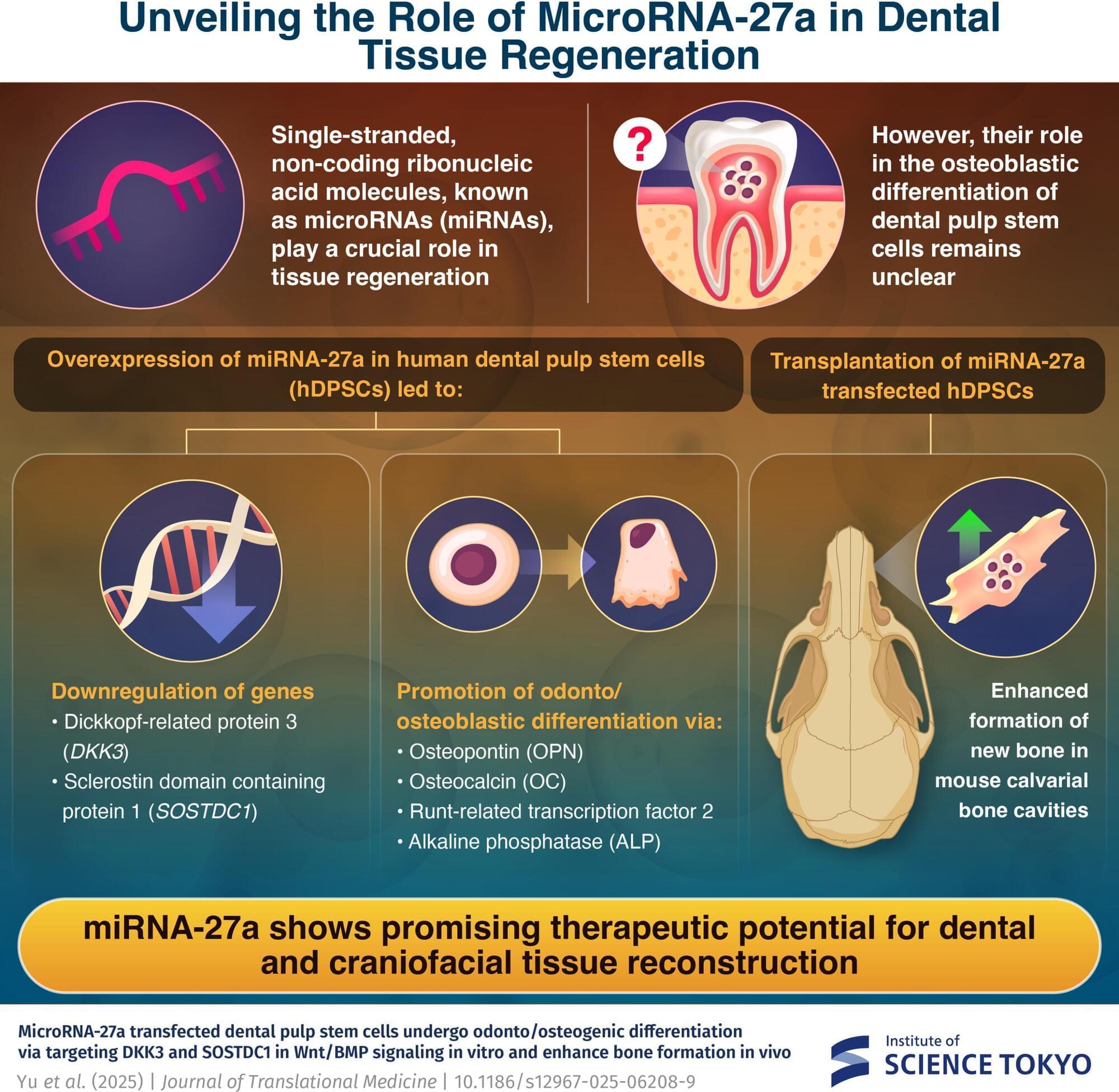
Overexpressing miRNA-27a in human dental pulp stem cells yields anti-inflammatory effect, may regenerate tissue
Dental caries (tooth decay) is a common oral health condition that often causes significant pain and discomfort and may even lead to tooth loss. In severe and untreated cases, bacterial infection combined with the host’s immune response can cause bone resorption, or the breakdown of bone tissue in the tooth root. Moreover, traditional treatments for advanced dental caries, such as surgery, can result in bone defects that require complex bone grafting procedures.
Building on this knowledge, bone tissue engineering and dental tissue regeneration have gained the attention of researchers worldwide. Recent reports suggest that microRNAs (miRNAs)—small, non-coding ribonucleic acid sequences—play a key role in bone tissue regeneration. However, the underlying mechanisms and pathways regulated by miRNAs remain unclear.
To investigate the intrinsic processes involved in dental bone repair, a team of researchers led by Associate Professor Nobuyuki Kawashima, graduate student Ziniu Yu, and Professor Takashi Okiji from the Graduate School of Medical and Dental Sciences, Institute of Science Tokyo (Science Tokyo), Japan, has conducted a series of innovative experiments using human dental pulp stem cells (hDPSCs) and mice.
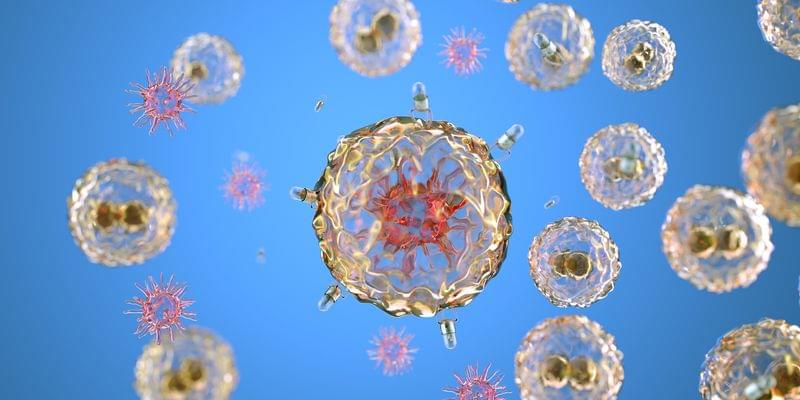
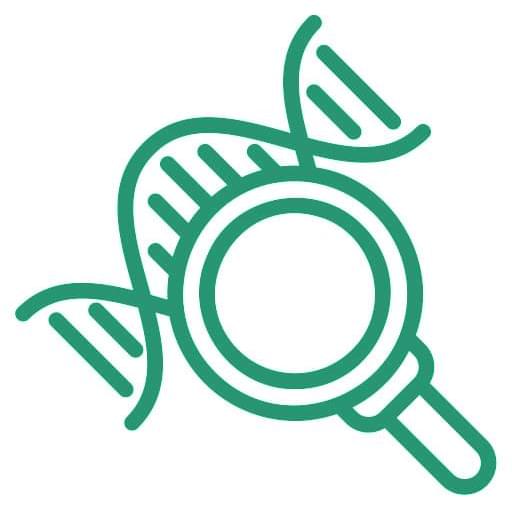
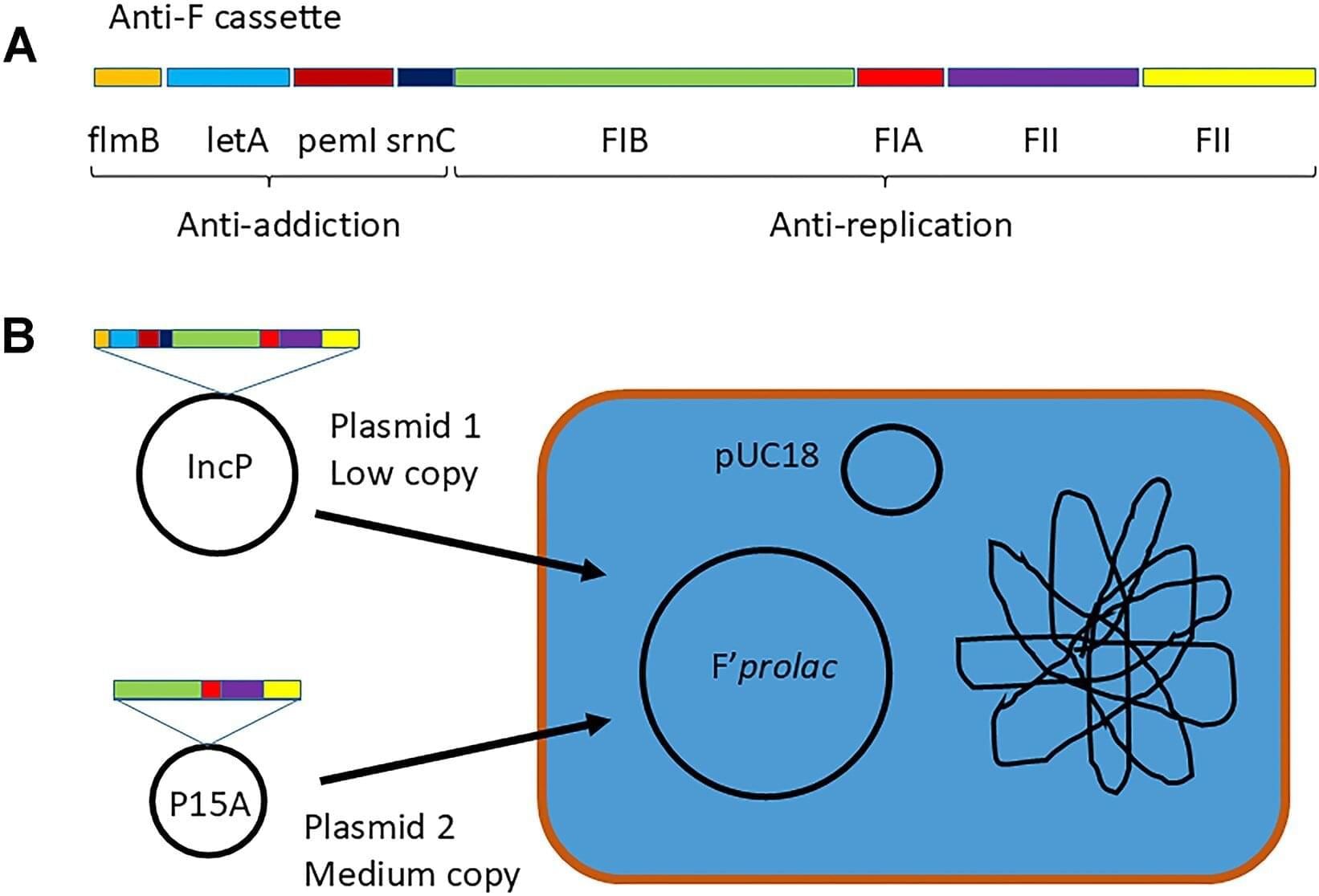
Key genetic code identified for ‘displacing’ bacterial antibiotic resistance
Birmingham scientists have identified an essential genetic code for a method called plasmid curing, which aims to “displace” antibiotic-resistance genes from bacteria.
Plasmids, which are small, circular strands of DNA, play a crucial role in allowing bacteria to share beneficial genes rapidly in a changing environment, most concerningly when they carry genes conferring resistance to antibiotics.
Professor Chris Thomas from Birmingham’s School of Biosciences has investigated plasmid curing for many years, and engineered useful “multi-copy” (many copies in each bacterium) plasmids for this purpose, resulting in a patented, efficient way to displace unwanted plasmids that carry resistance.
What If We Could Program Life Like Software?…It’s Already Happening!
Synthetic biology explained, future of synthetic biology, what is synthetic biology, creating life from DNA, synthetic life creation, synthetic biology techn…
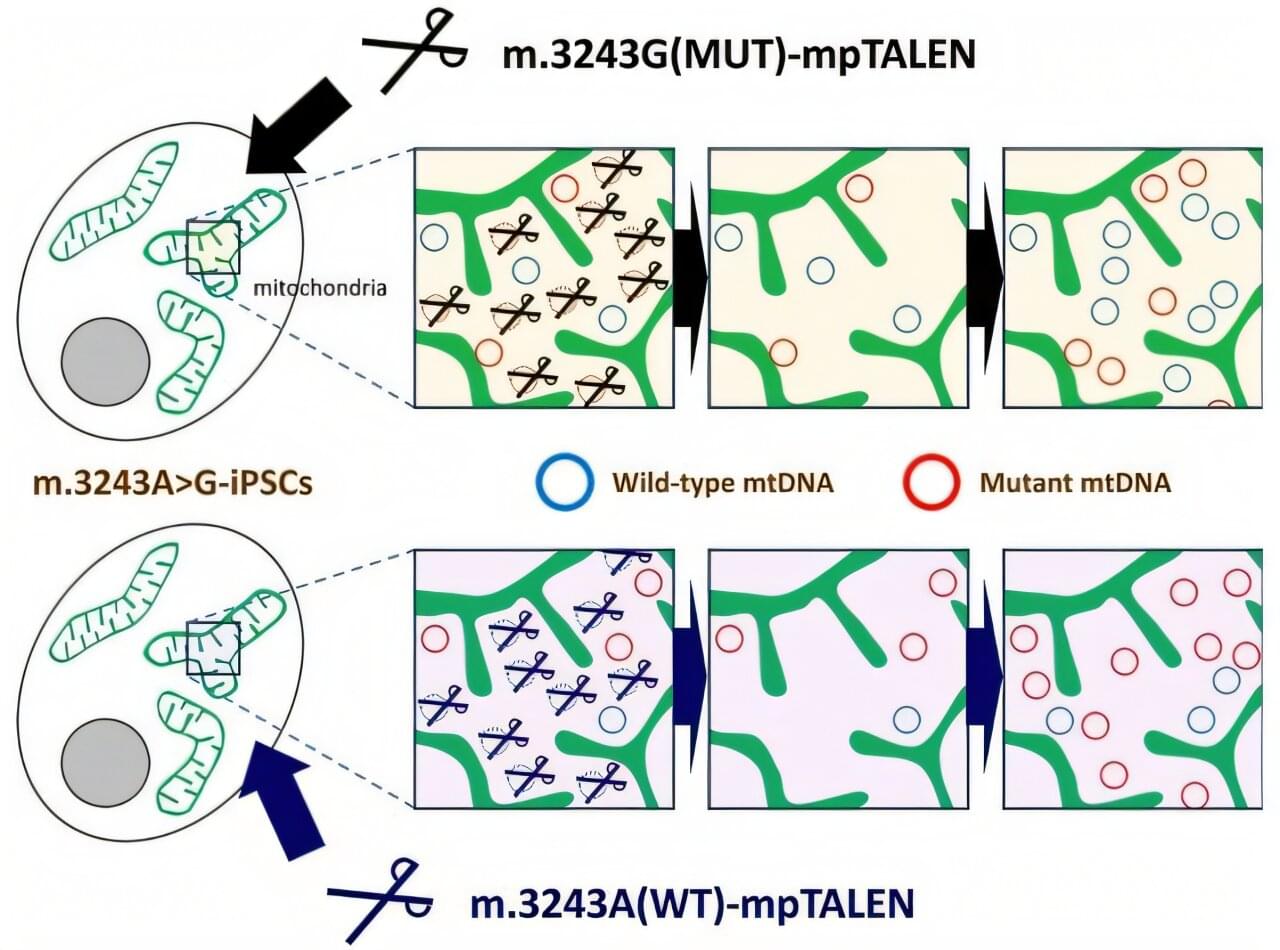
Engineered enzymes enable precise control of mitochondrial DNA mutation levels in cells
Mitochondrial diseases affect approximately 1 in 5,000 people worldwide, causing debilitating symptoms ranging from muscle weakness to stroke-like episodes. Some of these conditions result from mutations in mitochondrial DNA (mtDNA), the genetic material housed in these organelles. For patients with the common m.3243A>G mutation, which can cause MELAS syndrome (mitochondrial myopathy, encephalopathy, lactic acidosis, and stroke-like episodes) and diabetes mellitus, treatments remain limited.